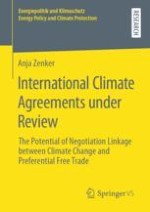2020 | Buch
International Climate Agreements under Review
The Potential of Negotiation Linkage between Climate Change and Preferential Free Trade
verfasst von: Anja Zenker
Verlag: Springer Fachmedien Wiesbaden
Buchreihe : Energiepolitik und Klimaschutz. Energy Policy and Climate Protection
